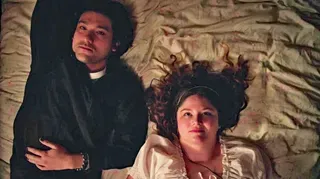December 14, 2014
Turning the Pages to Holiday Happiness
Kilian Melloy READ TIME: 4 MIN.
Uncertain what to get for people on your seasonal gift list? A trip to a local bookstore -- yes, a few remain -- will offer a trove of ideas, some of which follow.
The implicit and often explicit homoeroticism of life in the armed forces is captured by Dian Hanson in the lavish "My Buddy: World War II Laid Bare" (Taschen, $69.99). Many members of the Greatest Generation serving in the military had intense same-sex longings, not all of which were consummated. This book, filled with beautiful photographs of young, nude soldiers, marines, and sailors on beaches in the South Pacific, captures the joy and openness of those natural experiences. Scotty Bowers (Full Service) provides an insightful introduction. Additional contributors include the late, openly gay Gore Vidal (who served), Alan Berube, E. B. Sledge, and James Jones.
Bob Hope (1903-2003) entertained troops in the Second World War, the Korean War, and the Vietnam War. In "Hope: Entertainer of the Century" (Simon & Shuster, $35), Richard Zoglin insists that the book's title is not hyperbole, but doesn't prove his case. He does, however, succeed in reminding readers how fleeting great fame can be. Hope began in vaudeville, then scored in Broadway musicals including Cole Porter's "Red Hot and Blue" (1936) with Ethel Merman and Jimmy Durante, on radio, in movies, and on television. He hosted more Oscar ceremonies than any other performer. His monologues influenced many, including Woody Allen, but his topical humor, though funny once, has not held up. Despite his seemingly happy marriage to minor singer Dolores DeFina, Zoglin reveals what was likely an earlier wife, whom he may not have divorced, his countless affairs, his dislike of long-time co-star Bing Crosby (whose popularity and range exceeded his), and his inability to quit performing, even after audiences no longer cared. He also alienated many young people by supporting the Vietnam War. The professional Hope has an important place in the history of 20th century American show business, but popularity alone is not sufficient to justify the book's title.
Before Charlie Rose, there was Dick Cavett, whose "Brief Encounters: Conversations, Magic Moments, and Assorted Hijinks" (Henry Holt, $26) is a collection of impressions and recollections. Among the most memorable are a meeting with a breathtakingly beautiful Elizabeth Taylor on the Starlight Roof in Manhattan; seductive phone calls from a nonagenarian Marlene Dietrich; and his friendship with the brilliant, superbly self-educated, and lonely Groucho Marx, whom Cavett admires above all other comics.
"Cecil Beaton Portraits & Profiles," edited by Hugo Vickers (Frances Lincoln, Ltd., $45), is a riveting look at the acclaimed photographer and designer's impressions of some of the most famous persons of the 20th century. His diaries show him to be exacting in assessing the appearances of his subjects, and their character. For example, Jacqueline Kennedy, whom he admired immensely, was not nearly as lovely as her "infinitely more beautiful sister" Lee Radziwell, yet she was remarkably more photogenic. Among the many entries and portraits, those of Princess Margaret, Elizabeth Taylor, Greta Garbo (with whom the gay Beaton became infatuated), and Barbra Streisand (whom he found striking) are especially engrossing.
Art and history lovers will be fascinated by Alexander Lee's "The Ugly Renaissance: Sex, Greed, Violence, and Depravity in an Age of Beauty" (Doubleday, $30). Magnificent paintings and Castiglione's The Book of the Courtier not withstanding, this was a rough world, one that produced Machiavelli's "The Prince," a ruthless guide for attaining and maintaining power. Lee does a superb job in recreating the era, while focusing on individuals. Michaelangelo, for example, seldom bathed, was notoriously difficult, and was not easy on those he loved, female or male. One of the most fascinating sections deals with the unofficial tolerance of male homosexuality: Florence was regarded as the capital of sodomy. Same-sex relationships seem to have been consecrated in churches, and leading families accepted "friendships" between their sons as beneficial alliances, not unlike those celebrated and cemented by traditional marriages.
Travelers on your list may encounter delays at airports, so fiction may be the right choice for them. Fans of Hercule Poirot will be delighted by Agatha Christie's "The Monogram Murders," written by Sophie Hannah (Morrow, $25.99). The prickly Belgian's supper in a London cafe is interrupted by an upset, enigmatic young woman, who says she is going to be killed, but wants him to take no action to prevent her murder. She insists that all will be rectified once she is dead. Later, Poirot learns of murders at a swank hotel. That killer has left behind a single, monogrammed cufflink alongside each victim. Is there a connection between these events? Poirot's ever-sharp little gray cells will find out. Christie knew how to plot, and she would have approved of Hannah's impressive puzzle.
Historical fiction can be very informative, as Joseph Roth's "The Hundred Days" (New Directions, $22.95) proves. Napoleon's escape from Elba thrilled his many supporters in and out of France and terrified Europe's monarchies -- Louis XVIII fled from his newly occupied French throne. After 100 days, the 1815 Battle of Waterloo permanently ended the Corsican's ambitions. Roth tells the story of that heady, tragic period from Napoleon's perspective and from that of Angelica, a lowly palace laundress who loves him. The narrative is set primarily in Paris, which is beautifully recreated.
Kilian Melloy serves as EDGE Media Network's Associate Arts Editor and Staff Contributor. His professional memberships include the National Lesbian & Gay Journalists Association, the Boston Online Film Critics Association, The Gay and Lesbian Entertainment Critics Association, and the Boston Theater Critics Association's Elliot Norton Awards Committee.





